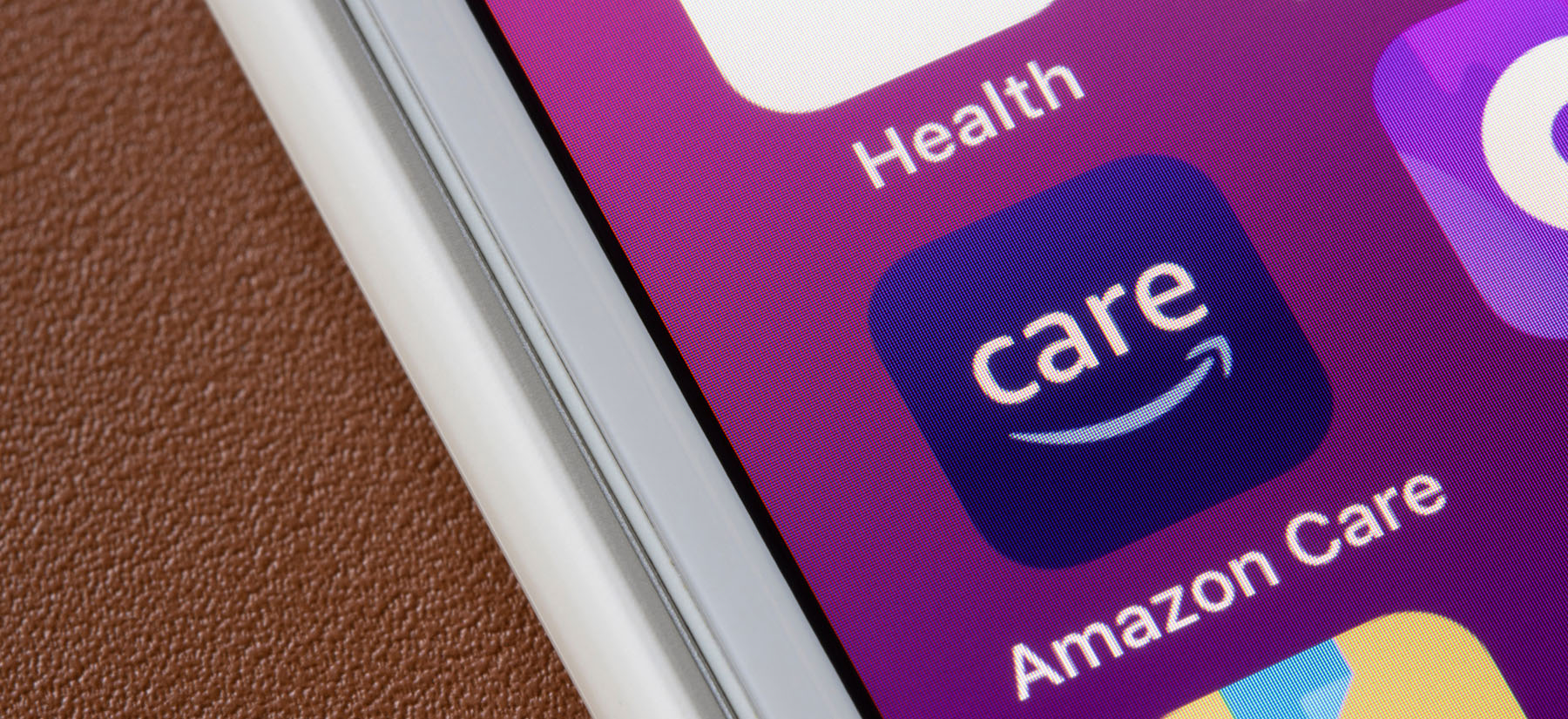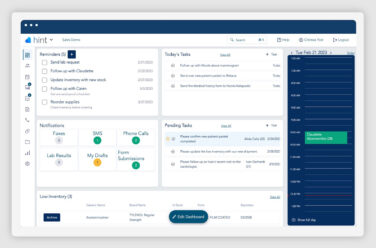The potential impact, promise, and/or threat (depending on your point of view) of big technology companies on the healthcare and life sciences industry has been discussed for years. It is obvious by now that players such as Amazon, Apple, Microsoft, Google, IBM, and more see potential in the healthcare space given some of the deals and partnerships they have made involving healthcare companies in recent years.
And their interest is not limited to any one aspect of the industry, as we have seen investments by Amazon in pharmacy, EHR, and telemedicine companies; by Microsoft lending its cloud computing and health IT services to companies such as Johnson & Johnson; Apple and Novartis collaborating on clinical trials; and that is only a small sample of examples.
But big tech hasn’t always had the easiest time in healthcare. Google Health disbanded in 2021 and the Amazon, JPMorgan, Berkshire Hathaway combined venture collapsed before it really even began. Yet, despite any failures or setback, these companies remain dedicated to making an impact in healthcare. To get a better idea of what kind of impact they may cause and where big tech’s expertise could be most useful, PM360 asked 10 experts:
- What impact have big tech players already had on healthcare through their respective efforts? Which big tech company are you most closely paying attention to in terms of their healthcare efforts? How do you see their impact evolving in 2022 and/or even further down the road?
- What areas of healthcare are most in need of technological innovation? How can big tech companies best help improve these specific areas?
- Why are some tech companies failing or struggling in healthcare? What, if anything, can be done to help them make the necessary adjustments to succeed in healthcare? Or do you think big tech will never be able to have the impact in healthcare they are hoping to make?
- What are the best partnership opportunities between big tech and life sciences companies? What are the best examples worth emulating? Are there any kinds of partnerships we haven’t seen much of yet that you think both industries could benefit from?
 “Alexa, please schedule an appointment with Dr. Green.” I have been following big tech moves in healthcare for well over a decade. While they have yet to have a significant impact, Amazon and Apple are poised to take advantage of the ongoing consumerization of health and the accelerant that the pandemic has been for virtual care.
“Alexa, please schedule an appointment with Dr. Green.” I have been following big tech moves in healthcare for well over a decade. While they have yet to have a significant impact, Amazon and Apple are poised to take advantage of the ongoing consumerization of health and the accelerant that the pandemic has been for virtual care.
Amazon has been experimenting with Amazon Care, wearables (Halo), and has over 200 million Prime members and a treasure trove of data. They also have a culture of experimentation and monetizing services that they create to drive more internal efficiency (e.g., AWS). It would not surprise me to see them scale their Amazon Care program and utilize their Prime membership in doing so.
Apple on the other hand can continue to ride the tailwinds of the ongoing growth of wearables and their watch. Tim Cook is on record indicating that healthcare is the biggest frontier for Apple and they have the hardware install base to drive significant impact once critical capabilities such as blood glucose testing becomes available.
Too Big to Fail
The misperception is big tech companies have failed in healthcare. They have the cash, patience, and expertise to experiment and learn, and a significant customer base to tap into once they find the right formula.
Both are in the top five companies in the world by market cap. In order to continue to have appreciable growth and materially grow their market cap they must move into the largest sectors and deliver solutions in the largest industries. In 2020, the global healthcare industry had an estimated value of $876.2 billion dollars. Forecasts predict 20% compounding annual growth rate for the next decade.
Healthcare has been, and continues to be, ripe for disruption by big tech. It is just a matter of time.
 The healthcare industry generates approximately 30% of the world’s data volume, and this is set to reach 36% by 2025—outgrowing manufacturing, financial services, and the media and entertainment industries. Capturing and making sense of this data will become an increasingly lucrative challenge—big tech’s venture capital operations invested almost $7bn in healthcare startups in the 18-months before mid-2021.
The healthcare industry generates approximately 30% of the world’s data volume, and this is set to reach 36% by 2025—outgrowing manufacturing, financial services, and the media and entertainment industries. Capturing and making sense of this data will become an increasingly lucrative challenge—big tech’s venture capital operations invested almost $7bn in healthcare startups in the 18-months before mid-2021.
A “Healthcare Revolution” is afoot, and big tech believes they’re best suited to lead the charge. While the technological advancements coming out of Silicon Valley will undoubtedly play their part, there are limits to what can be achieved in this highly complex, strictly regulated arena. Big tech must therefore work closely with industry specialists to adapt new technologies to meet the complex needs of global healthcare.
Adapting Tech to Healthcare’s Needs
Wearables, which play an increasingly important role in clinical trials, are a good example. They can provide a more holistic view of a participant’s life and the impact of the investigational product, without the need for regular site visits. However, day-to-day activity trackers, such as Fitbits, are not accurate enough to use in research. While rough estimates are fine for tracking a run or guiding a sleep regime, drug development has no room for error. Instead, specialist wearable sensors build on the same technology as smart watches but with the precision required for clinical research purposes.
The same is true in data analytics and insights. Where big data develops the means, sector experts adapt and enhance the methods to suit the highly sensitive nature of health data. This has proven crucial in making studies more efficient, shortening the time it takes to get life-changing drugs through clinical trials and into the hands of the people who need them.
 The global COVID-19 pandemic led to an upsurge in technologies related to healthcare ranging from novel ways to disinfect and slow disease transmission to improvements in patient management and treatment. But the true measure of these innovations’ success will be seeing how our healthcare system can transition from making these reactionary to sustaining them and making them part of our core function.
The global COVID-19 pandemic led to an upsurge in technologies related to healthcare ranging from novel ways to disinfect and slow disease transmission to improvements in patient management and treatment. But the true measure of these innovations’ success will be seeing how our healthcare system can transition from making these reactionary to sustaining them and making them part of our core function.
Several trends can be identified that will advance healthcare, and continued focus in these areas will serve to further the development of precision medicine, enable real-time remote monitoring, make hospitals smarter, lower healthcare costs, and save millions of lives. These trends include artificial intelligence, telemedicine, big data and analytics, digital therapeutics, genomics, and even blockchain. We must rethink many of our assumptions if we are to function normally in these times or any future pandemic, and big tech companies are well-poised to help us take on the challenge of building a sustainable system.
Increasing the Scope of Healthcare
We have seen tech companies partner with local governments to create public health dashboards, pivot their businesses to increase testing, develop new apps and tools, and perhaps most importantly, help deliver healthcare. In a country that ranks the lowest in terms of access to care and population health outcomes despite spending more than any other developed nation on healthcare, big tech helped us provide places for the large portion of the population that does not have a primary care physician or a specialist to turn to for care.
Technologies that support telemedicine will continue to be a critical component of our healthcare system, and as a country we should continue to look to big tech, entrepreneurs, and generous tech philanthropists to evolve these platforms, ultimately catering to different patient needs, such as primary care, mental health, or chronic condition management.
 Health technology companies must understand the challenges involved in changing healthcare delivery and establish realistic business models that support their efforts. At more than $4T, the U.S. healthcare industry delivers services that are expensive, not consumer-friendly, and wasteful. Indeed, about 25% of healthcare spending is wasted, according to some estimates. At the same time, quality, cost, and access to care vary widely, and public health and health equity performance compare unfavorably to other nations spending far less.
Health technology companies must understand the challenges involved in changing healthcare delivery and establish realistic business models that support their efforts. At more than $4T, the U.S. healthcare industry delivers services that are expensive, not consumer-friendly, and wasteful. Indeed, about 25% of healthcare spending is wasted, according to some estimates. At the same time, quality, cost, and access to care vary widely, and public health and health equity performance compare unfavorably to other nations spending far less.
Big tech, payers, investors, and many others have aimed to improve the situation by advancing new care delivery and payment models, and technology-driven approaches. We are seeing massive investment in new digital health tech companies, the evolution of retail health (such as CVS, Walmart, Walgreens), and the positioning of payers to become increasingly involved in care delivery.
Failure Should Not Impact Future Investments
The healthcare economy is complex, reflecting many stakeholders, a tangle of healthcare regulations, and intricate workflows. The slow pace of change and complexity have led to cataclysmic failures for businesses that were not ready to overcome these challenges and establish successful business models. Others have been tempted by the $1T in waste, without fully appreciating that it is not easily accessible; one organization’s waste is another’s profit. Still, there remains countervailing forces providing optimism for continued investment such as value-based payment models, increasing data liquidity, and, importantly, demand from consumers and employers.
Big tech has not been immune to these challenges despite having access to nearly unlimited capital, talent, and the ability to deliver stunning advances in technology. As big tech seeks scale relative to their core business, we can anticipate a continued evolution on where and how they play in healthcare.
 Healthcare innovation exists at the intersection of cost, quality, and equity—and in service to these aims, technology has already created positive changes throughout the care continuum. With COVID-19 plus economic and policy drivers forcing new reckonings, big tech is poised to play a role in remodeling the sector across three dimensions:
Healthcare innovation exists at the intersection of cost, quality, and equity—and in service to these aims, technology has already created positive changes throughout the care continuum. With COVID-19 plus economic and policy drivers forcing new reckonings, big tech is poised to play a role in remodeling the sector across three dimensions:
1. Making care geographically independent. Technology shifts where healthcare happens to better democratize care access and continuity. A telehealth-supported model, for example, aggregates distributed capacity and allows providers to meet the patient where they are, on-demand.
2. Informing personalized and population health. Innovations such as remote monitoring supply more data. As that data becomes more complete and liquid, it combines to yield a high-res view on a population’s health. Within this greater tapestry of patient information, providers can double-click to harness better insights for personalized care. This supports better decision-making, creating space for value-based care that’s deployable to the right patients at the right time.
4. Empowering patients. Technology, historically, has democratized access to various services and products and by that virtue is patient centric. People who feel engaged better navigate their wellness journey. This empowerment in turn helps users access healthcare products that best match lifestyles and goals.
Big tech can capitalize on these areas to shake up an otherwise traditional industry. Advantage will go to those firms that strike a perfect product-market fit that maps back to competitive strengths and investor expectations.
Acquisitions are a natural way in. Take Amazon’s purchase of PillPack: Aligning with Amazon’s mission and market advantage, PillPack scales into an Amazon-like experience to break through geographic barriers, collect data, and empower patients with convenience. Other matchups, like Oracle and Cerner’s, could be just as powerful. I’d expect to see more of these as digital health enters a new era of maturity.
 Technology companies are known for their agility and sprint approaches to software development. This focus/mindset makes them an asset in bringing efficiency to the delivery of clinical care at a time when clinical research timelines are generally increasing, with the exception of COVID-related trials.
Technology companies are known for their agility and sprint approaches to software development. This focus/mindset makes them an asset in bringing efficiency to the delivery of clinical care at a time when clinical research timelines are generally increasing, with the exception of COVID-related trials.
Partnerships that leverage the domain expertise of tech companies, such as AI, machine learning, and quantum computing, with our industry’s life sciences domain and data expertise, enable us to close the gap between the disciplines of care and research through interoperability and AI/advanced data analytics.
Coming Together to Solve the Life Sciences Industry’s Problems
Tech companies are sharing their expertise and aligning industry partners through cloud platforms and API tools, creating a common language and path to scale. The best opportunities are when both parties commit human capital and resources to solve specific industry problems, providing funding and support over multiple years, and in some cases co-location.
For example, the Clinical Research Network developed between ICON and Veradigm, which aims to expand access to clinical research to accelerate trial recruitment and enrollment rates, came about in part because both companies leverage partner Microsoft’s Azure infrastructure and tools, making integration easier. In addition, it helps to have a common party working on industry solutions, providing visibility to roadmap functionality that can help to shape multi-year partnerships.
 Four big tech players have significantly impacted healthcare through their respective disruptive efforts to advance the “consumerization” of health and revolutionize medicine delivery, clinical research, and personalized healthcare.
Four big tech players have significantly impacted healthcare through their respective disruptive efforts to advance the “consumerization” of health and revolutionize medicine delivery, clinical research, and personalized healthcare.
1. Amazon: A major disruptor as evident with the purchase of PillPack in 2018 (https://bit.ly/3HEpiNK); the launch of Amazon Care in 2019, which provides virtual health service benefits to employees and is now expanding to other companies nationwide (https://cnb.cx/3LphQsl); and Amazon Pharmacy in 2020. Amazon is the big tech leader. I foresee them evolving health delivery services further and expanding into drug discovery.
2. Apple: Its disruptive efforts include HealthKit, the first “informatics mobile app,” and Apple Watch, the company’s “most personalized device” which has delivered on the promise of chronic health management. From ECGs, to fall detection, to sleep and blood oxygen monitoring, the cases are endless. I think Apple will evolve its apps and be the foundational platform in the Software as a Medical Device (SaMD) space.
3. Google: The launch of Project Baseline (10,000 volunteers of health data) in 2015 and its ultimate transition into Verily Life Sciences became a foundational health data set for clinical research studies (https://bit.ly/3LpfyJu). In 2021, Otsuka, Click Therapeutics, and Verily formed an alliance for remote clinical trial work—a program designed to measure digital therapeutics interventional effectiveness with major depression disorders. I anticipate Google’s contributions to disease research to grow.
4. Microsoft: While a bit late to the healthcare disruption table, its recent developments make it clear they are a player gaining formidable traction. In December 2021, the company announced a strategic alliance with CVS Health to deliver on next-gen care models through the cloud and personalization to drive accessibility and affordability and extend digital health from store point of care to home (https://bit.ly/3oyor9S). I expect Microsoft will evolve its platforms to benefit healthcare and delivery workflows.
 More and more, big tech players are helping to put healthcare information, control, and decisions directly into people’s own hands by tapping into technology. One way we see this is in the form of wearables. Health-related statistics can be tracked and assessed in multiple ways—some even analyzing how they impact a person’s overall health—without consulting with a healthcare practitioner.
More and more, big tech players are helping to put healthcare information, control, and decisions directly into people’s own hands by tapping into technology. One way we see this is in the form of wearables. Health-related statistics can be tracked and assessed in multiple ways—some even analyzing how they impact a person’s overall health—without consulting with a healthcare practitioner.
Why Tech Companies Struggle in Healthcare
While these advancements are impressive and hold a great deal of actionable data about a person’s health, they do bring up several potential challenges, such as access, which contribute to why you may see some successful tech companies struggle when they enter the healthcare space. The companies that have a deeper understanding of the healthcare environment and its challenges, and proactively work to navigate them, will be the ones you will see succeed.
 Innovation in technology for healthcare should be purpose-driven and focused on improving health outcomes. One of the key areas in which big tech players can add value is by enabling the entire healthcare ecosystem to better engage consumers and physicians—with the purpose of providing the right information and timely experiences to improve diagnosis, initial treatment, and adherence. It’s important that big tech and platforms evolve from serving the mass market to serving the emerging needs of personalized and complex therapies.
Innovation in technology for healthcare should be purpose-driven and focused on improving health outcomes. One of the key areas in which big tech players can add value is by enabling the entire healthcare ecosystem to better engage consumers and physicians—with the purpose of providing the right information and timely experiences to improve diagnosis, initial treatment, and adherence. It’s important that big tech and platforms evolve from serving the mass market to serving the emerging needs of personalized and complex therapies.
A significant amount of discussion is happening around the impact of third-party cookie depreciation, solutions for media and analytics, as well the application of AI in healthcare—from drug discovery all the way down to tuning a marketing message. What’s needed is an elevation in the conversation of making privacy enabled and trusted data shareable and actionable.
Making Data More Accessible
Big tech covers not only technology but, in some cases, owns some of the walled gardens of information about consumers and physicians. Providing frameworks and services to manage data ownership and rights at an individual level, coupled with an ability to share information with the healthcare ecosystem, is a need big tech can address.
The reason big tech will be a key to solving this challenge is not only because of technology but the relationships big tech can facilitate. To truly drive positive health outcomes, big tech can help champion data being managed in a secure and privacy-first manner and accessible seamlessly across the entire healthcare ecosystem from payers, to providers, to physicians all the way to the patients and caregivers.
 Big tech, with their pockets full of cash, is an aggressive creature that looms over just about all industries. From media to supermarkets, the role of technology is so inculcated into business and society that almost any industry raises these questions that become essentially existential. So, the life sciences industry is hardly unique here. But if we break the issues down a bit, ultimately pharma doesn’t want to be Apple and Apple doesn’t want to be pharma.
Big tech, with their pockets full of cash, is an aggressive creature that looms over just about all industries. From media to supermarkets, the role of technology is so inculcated into business and society that almost any industry raises these questions that become essentially existential. So, the life sciences industry is hardly unique here. But if we break the issues down a bit, ultimately pharma doesn’t want to be Apple and Apple doesn’t want to be pharma.
The real opportunity is not to blend this dynamic into some economic battle for clicks and scripts but leverage John Nash’s Nobel Prize winning game theory to create a win-win construct. Big tech owns the customer experience and data acquisition. Pharma owns drug development. And these are two critical legs of the proverbial three-legged stool. The market opportunity is finding the lightning. And that can be the domain of either pharma, big tech, or a completely new innovator of any size.
The Expansion of Healthcare and Tech
Further, the healthcare market size is far from fixed. It’s expanding. Apple’s role in this area (its biggest legacy according to CEO Tim Cook) will establish and grow new markets that can offer tremendous opportunities for pharma to navigate in the context of Rx or prescription digital therapeutics. And the innovations of the pharma side will do the same for big tech.
The current state is in flux. From genomics to robotics, healthcare is an amorphous, living creature that is evolving against conflicting desires of innovation, complacency, and fear. But the battle is less about business and much more about leveraging these unique strengths to advance healthcare for all.








